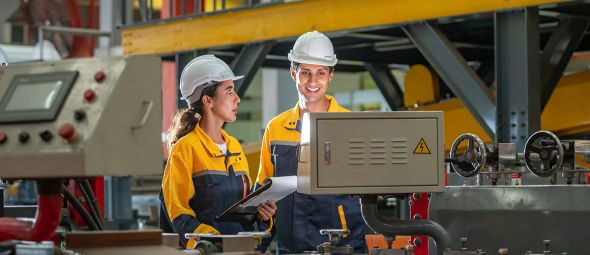
How Businesses Can Advance Manufacturing's Future through Collaboration with Workers
Join us on 12/18 for a virtual conversation on how innovations in job design and worker partnerships can help manufacturers meet business priorities, increase worker satisfaction, improve sustainability, and promote long-term business success.
Grantmaking and Partnerships
Led by a cross-sector Leadership Board that is ideologically diverse and representative of often-siloed groups, WorkRise invests in research on policies, programs, and practices that have the potential to accelerate economic security and mobility for low-wage workers. We fund analyses and the creation of data that shed light on labor market barriers, trends, and opportunities. And we engage in strategic partnerships that help advance evidence-based solutions in support of our mission. Learn more about our most recent request for proposals and how you can collaborate with WorkRise.
The Latest
In Depth

Worker voice, representation, and power
Feature
Last updated on October 24, 2024
Segregation in the Low-Wage Workforce
Over the past 50 years, the composition of the low-wage workforce has changed: more than half of low-wage workers are now people of color, up from just 20 percent in 1971. Today, Black, Latino, and women workers are more likely to be segregated into worse-quality and lower-paying jobs.
WorkRise Research

Employer practices
Last updated on November 19, 2024
Video
WorkRise Shorts: Overcoming Racial Disparities in Manufacturing Recruitment and Training Programs
Can a new local manufacturing workforce development program that targets workers who are not traditionally engaged in the sector overcome racial disparities in its hiring and wage rates?
Last updated on November 19, 2024
The Latest

Job search and matching
March 12, 2024
Research Summary
Self-Employment Savvy: The Relationship between Financial Literacy and Working Independently
Individuals with higher levels of financial literacy are more likely to work for themselves than participate in traditional employment, no matter their race or ethnicity. This relationship is even stronger for women, demonstrating the importance of financial education and confidence-building in an economy where non-White and female workers face significant barriers to self-employment.

Social determinants of work
March 05, 2024
Article
Move to Opportunity or Invest Locally: What helps workers get ahead?
Federal, state, and local investment in underresourced communities is more effective in improving low-wage workers’ economic mobility than moving them to well-funded communities.

Skills and training
February 27, 2024
Video
WorkRise Shorts: Perspectives on Learning and Employment Records, with Jhacole LeGrand-Dunn
How can a learning and employment record, a new kind of credentialing tool, promote greater equity in the US jobs market? Answering this question is Jhacole LeGrand-Dunn, Senior Director, Pathways, at Digital Promise, and a member of the Retail Opportunity Network, a community of leaders focused on upskilling and economic mobility. LeGrand-Dunn explains how learning and employment records can open up more pathways to access to jobs and enable more equitable access to jobs.
February 27, 2024
Research
Job search and matching
Report
July 20, 2022
Search and Matching in Modern Labor Markets: A Landscape Report
This landscape report synthesizes research on how job seekers find work and how employers post and fill open positions in the labor market. It also explores frictions experienced by both parties and implications for workers’ economic mobility.
WorkRise Research
Worker voice, representation, and power
Report
July 11, 2022
U.S. Workers’ Organizing Efforts and Collective Actions: A Review of the Current Landscape
The report summarizes research evidence on the size of the voice and representation gaps workers are attempting to fill, and provides examples of different strategies workers are using to address the gap.
Grantee Research
Employer practices
Report
June 17, 2022
Employer Practices and Worker Outcomes: A Landscape Report
Commissioned by WorkRise, this report by researchers at the MIT Sloan School of Management summarizes evidence on employer practices that influence economic mobility and promising areas for research to advance the state of policy and practice.
WorkRise Research
Social determinants of work
Executive Summary
March 29, 2022
Income Inequality, Race, and the EITC
New grantee research finds the 1993 expansion of the earned income tax credit reduced income inequality among Black and white households in the lower half of the income distribution through a significant employment response among Black households.
March 29, 2022

